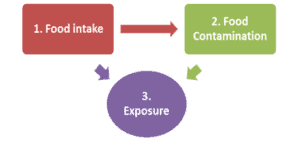Total Diet Study Exposure – TDS-Exposure
Total Budget: € 7,575,000
Consortium: 26 partners
Countries: 19
Duration: 1 Feb 2012 – 31 Jan 2016
Website: www.tds-exposure.eu
Background
Total diet studies (TDSs) complement traditional monitoring and surveillance of population dietary exposure to nutrients and non-nutrients (including contaminants), and potential impact on public health. TDSs facilitate risk assessment and health monitoring, but some EU Member States and candidate countries do not have TDS programmes or use a variety of methods to collect data. As a result, comparison of data is not always possible.
Objectives
TDS-Exposure focused on exposure to food contaminants, including heavy metals, mycotoxins and persistent organic pollutants (POPs, e.g. polychlorinated biphenyls), that pose a risk to human health and the environment, and estimated chronic exposure to pesticide residues in food as well as food additives intake. However, exposure was based on whole diets, as consumed, rather than contamination of raw commodities, thus resulting in a more realistic measure of exposure to potentially harmful compounds than those currently available.
TDS-Exposure standardised methods for food sampling, analysis, exposure assessment calculations and modelling, priority foods, and selection of chemical contaminants. In the process, a variety of approaches and methods for sampling and analysis were assessed and best practice defined. Contaminants and foods that contribute most to total exposure in Europe were also established.
Role of ILSI Europe
ILSI Europe, via its Food Intake Methodology Task Force, contributed to the work package on ‘Dissemination and Stakeholder – User Communication’. The remit of this work package was to communicate to key stakeholders the goals, methodologies and expected results of the project.
In February 2014, TDS-Exposure hosted its first stakeholder meeting ‘Better Data – Better Decisions’, in Brussels, Belgium, to present the work of all work packages to stakeholders from industry, academia and regulatory agencies. The workshop, organised by ILSI Europe, put TDS-Exposure activities into context by providing an update on the state-of-the-art in TDS and information about TDS in Europe, as well as describing the project organisation and potential outputs. During the workshop, it was demonstrated how TDS could be improved with better tools and understanding of underlying issues. It also highlighted the importance of better data for better decision-making.
Issues identified during discussions included maintaining focus on risk not hazard, inclusion of beneficial compounds (e.g. nutrients), applicability of TDS for different sub-groups, links between populations and substances of interest, analysis of composite dishes, water with or without salt, speciation, pooling, sample storage, aggregation, spread, certified reference materials and suitability of FoodEx2 (version 2 of the EFSA Food Classification and Description System for Exposure Assessment) for TDS. A comprehensive report on the workshop discussions and results is publicly available on the project’s website.
The second and final stakeholder consultation ‘A Harmonised Approach to European Total Diet Studies’ was held on 8 October 2015, in Brussels, Belgium, during the fourth year of the project. The main objective of this final workshop was to disseminate project results to stakeholders and facilitate sustainability of the project outcomes. In total, 75 participants attended this workshop, 47 stakeholders and 29 representatives from the beneficiaries, with a balanced representation from European Member States (24) as well as from the US, Canada and Colombia. Stakeholder groups included food authorities (63%), with representatives of EFSA, WHO, FSA, US FDA, EC, DG SANTE, EC JRC-IRMM and Health Canada; academia (17%); NGOs (13%); and food companies (7%). Likewise, the report on the workshop contents and discussions is publicly available on the project’s website.
At the Final General Assembly meeting, held on 13-14 January 2016 in Maisons-Alfort, France, the main outcomes and conclusions of the project and further sustainability were addressed by the consortium partners, with the participation of scientific advisors from EFSA and the WHO GEMS-FOOD program. As a result of the project, 11 publications were prepared, several training workshops and individual training exchanges organised, two stakeholder workshops coordinated by ILSI Europe and a new e-learning module on TDS developed, aiming to promote better handling of dietary exposure data and to establish a legacy of harmonised methods and science-based recommendations for the improvement of public health worldwide.
Impact
TDS-Exposure spread excellence in total diet studies amongst all stakeholders. It developed harmonised methods for sampling and analysis, and science-based recommendations for future global studies. The European database of TDS studies built during the project is aimed to be useful for risk assessors and risk managers.

For more detailed information on the project, please contact Dr Stéphane Vidry at svidry@ilsieurope.be or Dr Estefanía Noriega at enoriega@ilsieurope.be, or visit the website.
Read More
TDS-Exposure leaflet
TDS-Exposure Newsletter #1
TDS-Exposure Newsletter #2
TDS-Exposure Newsletter #3